Court Finds Same-Sex Couples May Be Evaluated for Adoption, NGO Says
ZAGREB, 26 May 2022 - The Dugine obitelji (Rainbow Families) NGO said on Thursday the High Administrative Court delivered a precedent ruling that all life partners may be evaluated for adoption suitability and must not be discriminated against on sexual orientation grounds.
"They can no longer discriminate against you based on sexual orientation, they can turn you down based on some criteria," said the NGO's president, Daniel Martinović.
He said there might be difficulties based on discrimination, but hoped there would not be any, calling on everyone who encountered obstacles to contact the NGO.
The court dismissed the relevant ministry's argument that same-sex couples should not be assessed for adoption for the sake of "protecting the child's interest", he said, adding that the ministry can no longer appeal.
Dugine obitelji said the ruling had far-reaching consequences for LGBTIQ and same-sex couples' rights as it practically equated their rights and those of married couples. The ruling allows all same-sex couples to decide to start a family by adopting, it added.
Life partners Mladen Kožić and Ivo Šegota, whom the family ministry rejected for adoption in 2016 because they had become life partners, said they were happy with the ruling and the fact that "after six years state institutions will start treating our family as all other families."
In April 2021, the Zagreb Administrative Court found in favour of Kožić and Šegota, but the ministry appealed the ruling. After a year, the High Administrative Court dismissed the appeal.
For more, check out our politics section.
First Gay Marriage Held in Kutjevo, Heart of Slavonia
November 5, 2020 - The first gay marriage held in Kutjevo was between locals from the area of Čaglin Municipality.
As the city clocks struck midday, two men, locals from the area of Čaglin Municipality said goodbyes to their single selves and embraced their future together as husband and, well, husband. Their affirmations were heard in front of the registrar of Kutjevo and thus, officially, they became partners in a same-sex marriage. It was the first gay marriage to take place in Požega-Slavonia County.
Portal Požega.eu reported that the intimate marriage ceremony of the 47-year-old and his 32-year-old partner took place over recent days, far from the gaze of the public. The ceremony was a quiet and private affair. In rural areas like Požega-Slavonia County, such marriages are not always met with widespread approval. The city registrar reported that this was the first gay marriage they had been asked to witness, despite having been in the job for many years.
Though this may be the first gay marriage to take place in Požega-Slavonia County, hundreds of same-sex marriages have concluded in Croatia since 2014, when the Life Partnership Act came into force. In the time since then, male same-sex marriages in Croatia have been slightly more common than female ones. The largest number of such marriages took place in Zagreb. From published figures outside of Croatia, where same-sex marriages have been more commonplace over a longer period of time, same-sex marriages are frequently more stable with fewer ending in divorce compared to traditional marriages.
Life partnerships in Croatia
The first same-sex marriage in Croatia was concluded in August 2014, and despite the great interest of the public, the two male partners managed to keep the wedding a secret. Just like the couple from Kutjevo. The couple married in the first of the ceremonies in Croatia only went public with details just last year.
"I was very nervous in those days, it was a historic thing after all. If we could not have done it in Croatia, we would certainly move to a country where it was possible," one of the spouses, Ivan Zidarević, told 24sata, adding that society has changed for the better with the change in the law.
Zidarević said he believes that Croats are tolerant of gay couples. Their marriage ceremony in 2014 was witnessed by two registrars, godparents, several friends, but also the then-Minister of State Administration, Arsen Bauk, initiator of the Croatian Life Partnership Act. Bauk gave the couple a symbolic gift – a pair of ties.
According to the Law on Life Partnership of Persons of the Same-Sex, a life partnership is a family community of two same-sex persons concluded by the competent authority (a registrar). The process of concluding a life partnership in Croatia is very simple. It is necessary to report to the registrar, who then checks whether the preconditions for concluding a life partnership have been met and takes a statement on the choice of surname. After that, the time and place of the ceremony are agreed, which, along with the registrar and partners, takes place in the presence of the godparents.
Happiness despite condemnations
At the beginning of this year, the Constitutional Court decided that same-sex couples in Croatia have the right to be foster parents under the same conditions as everyone else. However, the current constitutional definition of marriage in Croatia does not include same-sex families. A change to legally recognise married same-sex partners in this way was this year demanded by the participants of Zagreb Pride, held on September 19, 2020. Pride organisers said that without a change in the recognition, state authorities are still restricting the rights of gay people and making them second class citizens.
In many EU countries, and more so in Zagreb here in Croatia, same-sex marriages are acceptable and almost every day. But, in rural areas such as Požega-Slavonia County, Kutjevo, and other places like these, such marriages are still of great interest and not universally embraced.
Although they live in an environment where they might encounter condemning views, the happy couple from Požega-Slavonia County decided to legalize their relationship. In comments on Facebook, people wished them luck, and one commenter jokingly wrote: "If they didn't make a toast with Graševina, they didn't do anything. Congratulations anyway!"
For the latest travel info, bookmark our main travel info article, which is updated daily.
Read the Croatian Travel Update in your language - now available in 24 languages
Croatia Gay Effigy Condemned: MP Files Criminal Charges Against Carnival
February 24, 2020 - MP Arsen Bauk SDP (Social Democratic Party) of Croatia has announced that he will file a criminal complaint against the organizers of the "Bakova povorka", which took place in the town of Imotski, at the local police station for burning an effigy of a gay couple. Zoran Milanović, President of Croatia, has demanded an apology from organizers and an appropriate response from the relevant legal institutions.
Numerous comments have appeared on social networks condemning the Imotski carnival (Bakova povorka), where an effigy of a same-sex couple holding a child was burned at the ceremony to widespread cheers. The child was presented in the form of SDP MP Nenad Stazić with a five-pointed star (Yugoslavia) on his forehead, according to Ana Roksandić/RTL Dnevnik on February 24, 2020.
Bauk to File Complaint Under Article 325 Croatia Criminal Code
Arsen Bauk has announced that he will file a criminal complaint against Milivoj Đuka, the organizer of the carnival parade, at the Imotski Police Station on Monday for the offense noted under Article 325 of the Criminal Code of Croatia.
There is a tradition of masks in Dalmatia, in which the people normally express their dissatisfaction with powerful political and social figures. However, the lynching of minority groups runs contrary to that tradition.
Croatia President Demands Appropriate Response for Shameful Event
Croatia President Zoran Milanović also responded to the "shameful event" on Monday morning.
"The symbolic burning of same-sex partners with a foster child in Imotski is a sad, inhumane and totally unacceptable act in the guise of the 'Bakova povorka' festivities. The organizers who staged this shameful event, in the name of tradition, deserve the strongest public condemnation because of the hatred they have demonstrated toward for others. Intolerance and inhumanity are not and will not be a Croatian tradition. I am seeking their public apology and the approptiate response reaction from the relevant institutions, especially as many children watched this event, thus witnessing the spread of hatred and inciting violence," he wrote on Facebook.
Former Croatia Prime Minister Jadranka Kosor reacted on Twitter:
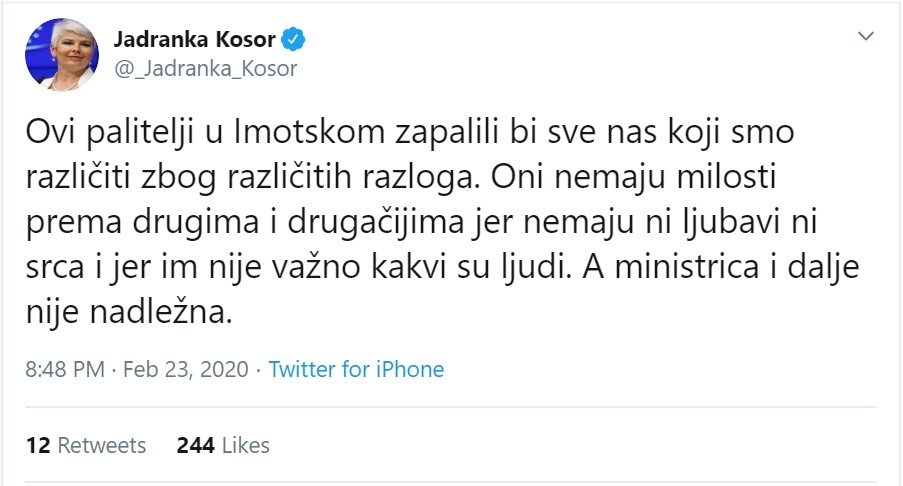
"These arsonists in Imotski would set fire to all of us who are different for various reasons. They have no mercy on others because they have neither love nor hearts and do not care what kind of people they are. And the minister is still incompetent," she wrote yesterday.
MP Bojan Glavašević also took to social networks to defend a same-sex couple, Ivo Šegota and Mladen Kožić, who want to adopt children.
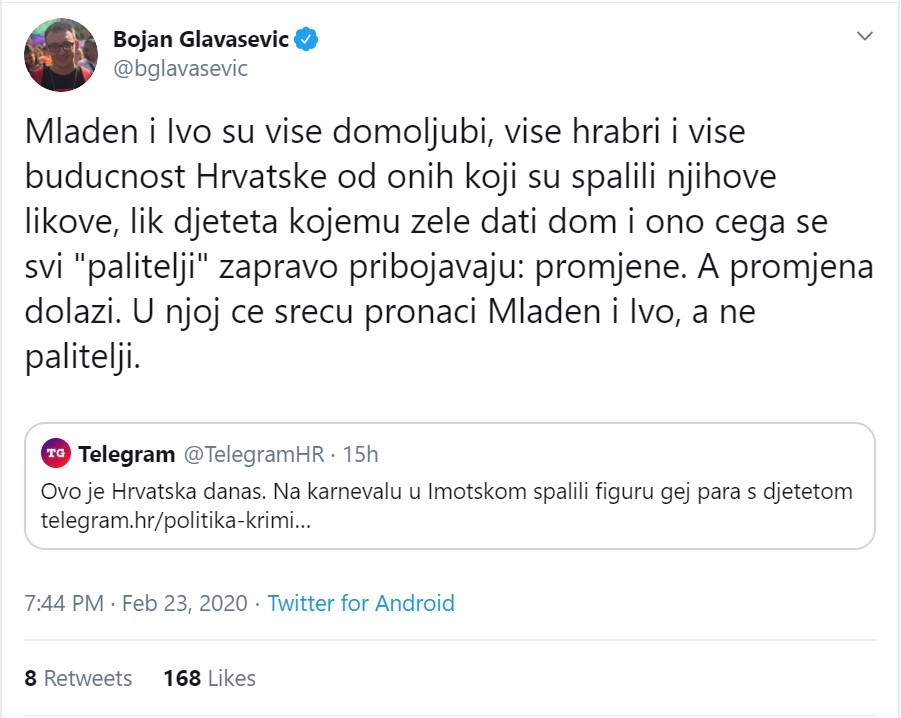
Croatia Gay Couple More Patriotic Than Imotski ‘Arsonists’
“Mladen and Ivo are more patriotic, more courageous, and more of a (positive) example for the future of Croatia than those who burned their characters, and the character of the child they wish to provide a home for. Change is what all these "arsonists" are truly afraid of. And change is coming. Within it, Mladen and Ivo will find happiness, not the arsonists,” he wrote in a Twitter post.
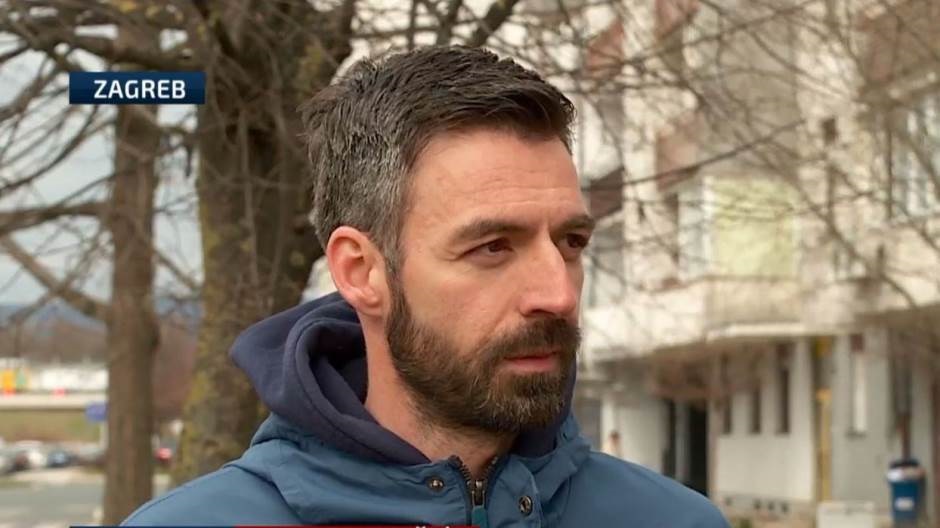
Kožić: 'I fear for all our friends who are already living with children in Croatia'
Mladen Kožić spoke to Hrvoje Krešić/N1 on Monday:
"This time I feel bad not only for myself, I am not afraid for either Ivo or myself, I fear for all our friends who are already living with children in Croatia," Kožić said.
"We know two fathers with a daughter in our first neighborhood and I feel bad for them because I cannot imagine how it must be for them now, and how they will explain to their children what exactly has happened," he added.
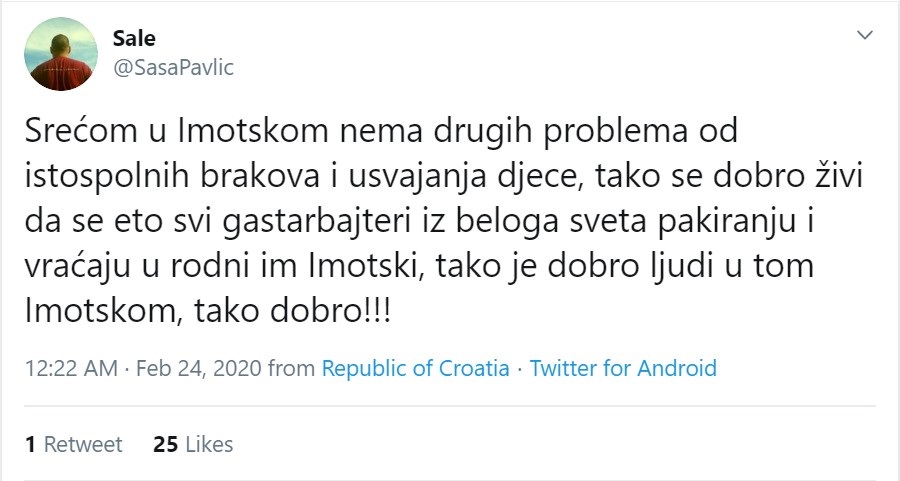
"Fortunately, there are no other problems in Imotski other than same-sex marriage and adoption of children, people are living so well there that all the gastarbeiters from this white world are packing and returning to their native Imotski, the people in Imotski have it so good, so good !!!", one Twitter user observed sarcastically. Milivoj Đuka, the parade's organizer, spoke to Dnevnik/HRT about the mass exodus from his hometown on June 21, 2015.
Interview with Đuka begins at 1:05.
Young Croatians Fleeing Imotski, Living Among Same Sex Couples Abroad
Thousands of young Croatians are fleeing to countries like Ireland, Sweden, Denmark, Germany and Austria where gay marriage and adoption are legal, and are living among openly gay and lesbian couples with children.
Another user emphasized that, according to carnival tradition, culprits should be burned for adverse behavior, not for adopting a child.
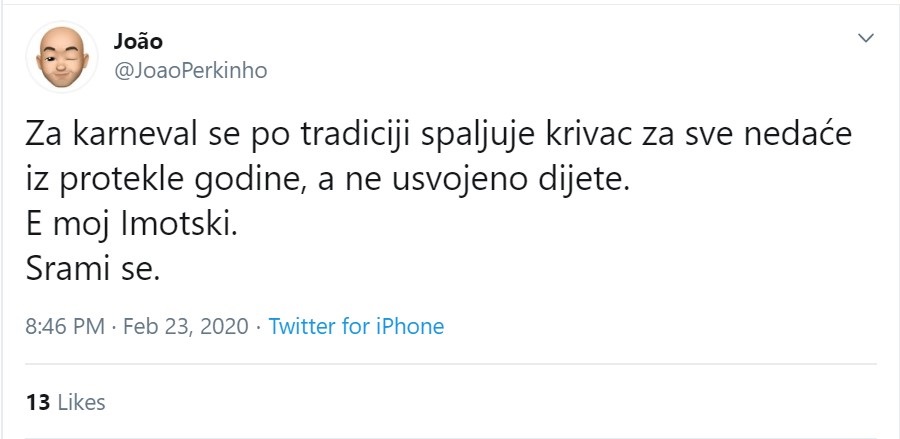
“According to tradition the carnival is traditionally an event to set fire to the culprit for all the troubles of the past year, not an adopted child.
My Imotski. Shame on you,” the user responded.
Act of hate speech?
Another user wondered if the gay couple effigy burning at the Imotski carnival was an act of hate speech.
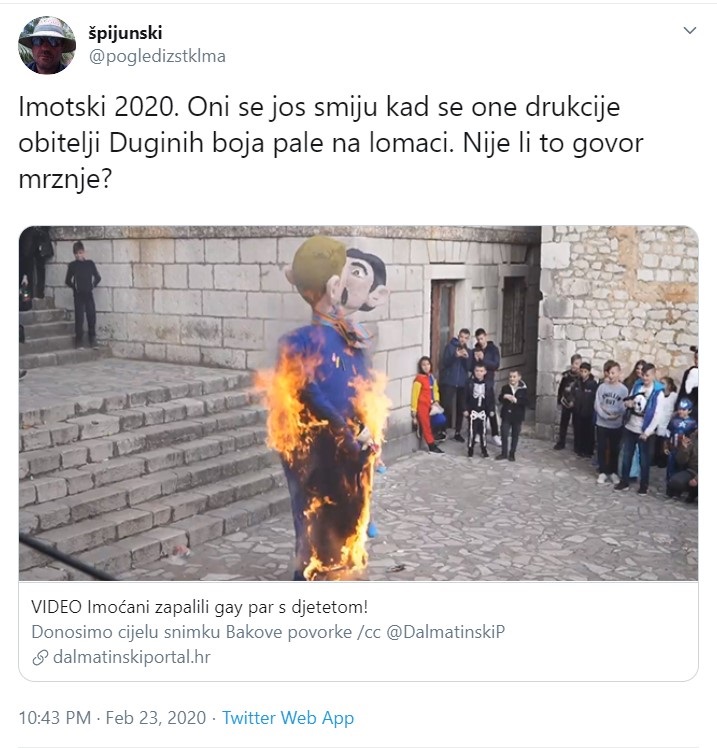
“Imotski 2020. They are still laughing when these alternative families of Rainbow colors fall into shambles. Isn't this hate speech?” the Twitter user asked.
The effigy of the gay couple is set on fire at 1:41:15 | Boško Ćosić Photography
See yesterday's Total Croatia News article about the effigy burning here. Follow our Politics page, Lifestyle page and this page for updates on this story and the state of LGBT rights in Croatia.
Croatia Town Burns Gay Couple Effigy at Parade: Imotski Residents Cheer
February 23, 2020 - Bakova povorka, the pinnacle of a 150-year tradition of carnival festivities in Imotski, Croatia was engulfed by scandal on Sunday afternoon when enthusiastic residents set fire to an effigy of a gay couple to widespread cheers.
Adopted Child Had Yugoslav Star on Forehead
Imotski residents chose to feature a gay couple with an adopted child, which had a five-pointed star on his forehead (resembling that of the Yugoslav flag) for the central carnival figure. They eventually set that effigy on fire and burned it to the ground to the cheers of onlookers.
“Like it or not, but this is abnormal for us, but everyone has the right to be whatever they want,” they proclaimed to onlookers.
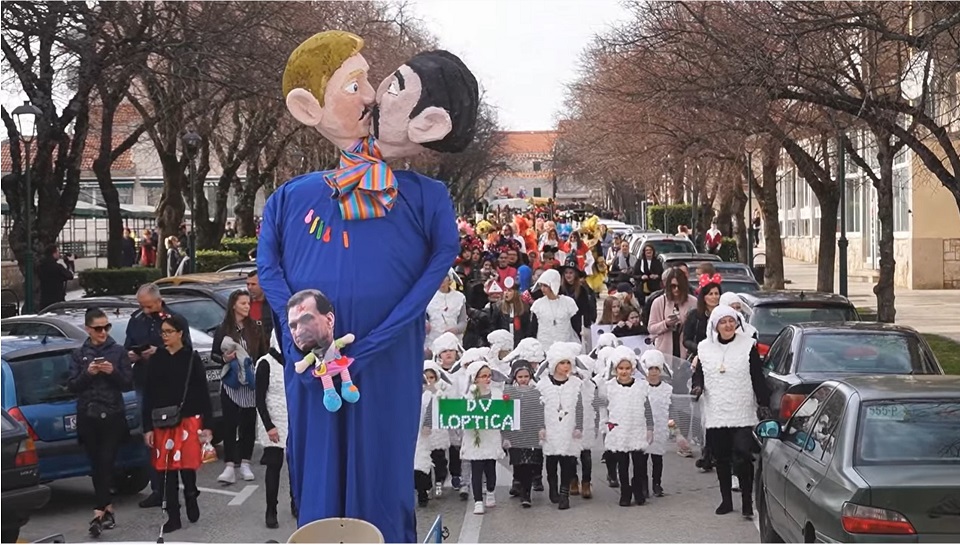
It’s also worth noting that the child doll, with the five-pointed star on his forehead and being held by the effigy of the gay couple, had the face of SDP (Social Democratic Party) MP Nenad Stazić. Earlier this year, it Stazić lent his support to same sex couples wishing to be foster parents. He also indicated that children were more at risk in the company of pedophile priests than under the care of openly gay foster parents. The effigy of the gay couple was followed by a group of children from the local kindergarten in the parade.
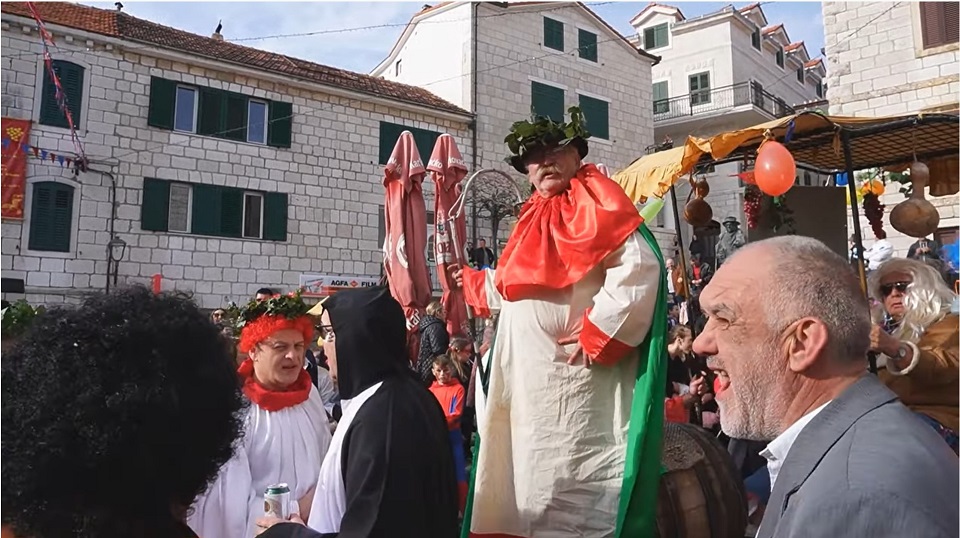
‘We are a conservative society’
"My head is spinning from this culture of death, and since my body is ailing, this year let’s set this grotesque family with baby Nenad Stazić on fire," the announcer proclaimed. Then, “Play the music" was heard as they ignited the effigy to wild cheers and applause.
When Slobodna Dalmacija asked Milivoj Đuka, president of the "Bako Ceremony Cultural Society" (KD Bakove svečanosti), for comment on February 23, 2020; he explained:
“We are a conservative society, and are sticking by tradition. Give a child to a mother, as the saying goes. We think this is the right thing to do,” Đuka claimed.
In an interview for Imotski Online on February 7, 2020; the festival's organizer had previously indicated that the main character of the parade would remain a secret.
"I can't reveal it to you. I can only say that everyone will understand who and what it is about," Đuka pointed out.
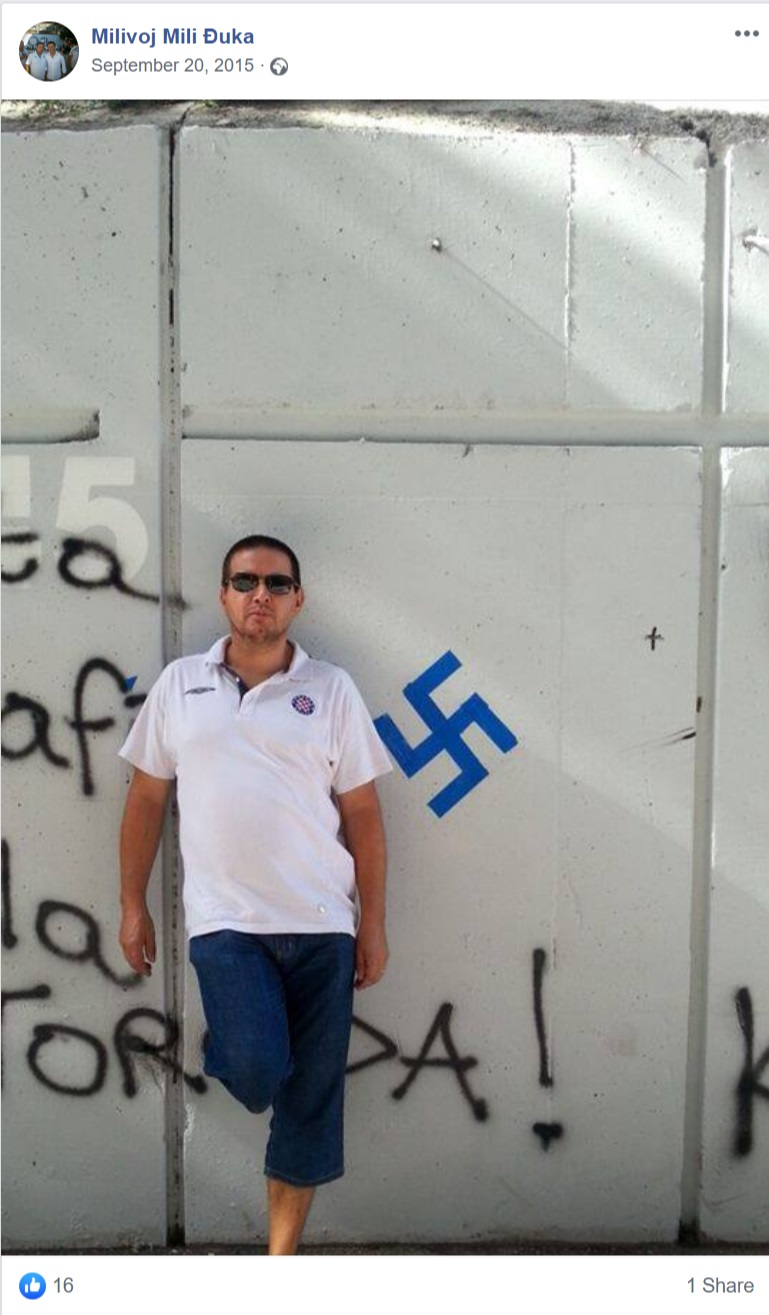
Milivoj Đuka | Facebook
According to a recent poll conducted by HRT (Croatia Radio Television); 63.7 percent of respondents are against allowing same-sex couples to be foster parents.
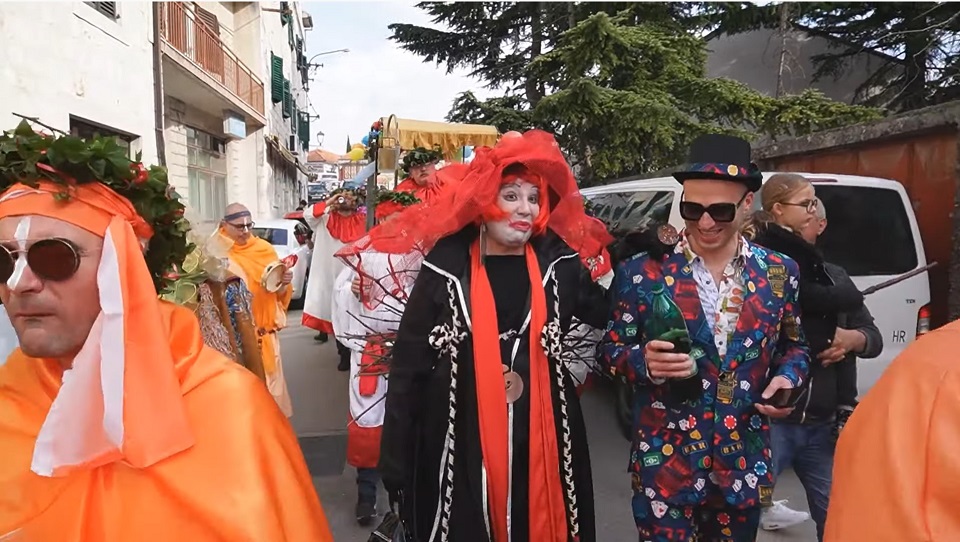
Croatia Parade Included Masks of Elvis Presley, Cleopatra, Josipa Lisac
Đuka made sure that there were as many masks as possible in the parade, all of which were made in homes throughout the town. Visitors also saw Nutcrackers, Cellists, Elvis Presley and his band, Flowers as well as individual masks of Cleopatra, and Pirates. In addition, there were homemade renderings of Croatia diva, Josipa Lisac, inspired by her performance at the inauguration of the new President.
The parade featured groups of children dressed like little lambs from the Kindergarten Ball, students from Imotski elementary schools, and many others.
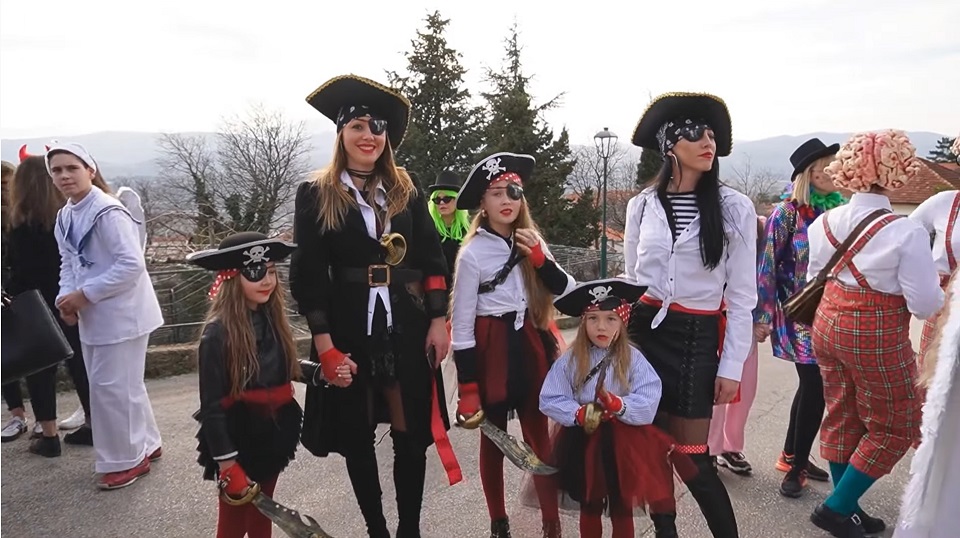
Members of the HPO Gradske glazbe Imotski (HPO Imotski Town Music Group), performed cheerful carnival songs for more than a thousand Imotski residents and their guests.
The effigy of the gay couple is set on fire at 1:41:15 | Boško Ćosić Photography
UPDATE February 24, 2020: Croatian leaders and citizens condemn effigy burning. MP Arsen Bauk files charges against event organizers.
Follow our Lifestyle page for updates on this developing story. More information on the "Bako Ceremony Cultural Society" (KD Bakove svečanosti) can be found on their website here and Facebook here.
Croatia Gay Couple Foster Care Applicants: Country Full of Hypocrisy
A Croatia gay couple, who want to become foster parents, have a message for haters: “We are a country full of hypocrisy,” they point out in yesterday's interview with RTL Direkt. Ivo Šegota and Mladen Kožić, who are in a life partnership, applied to become foster parents in 2017. After passing extensive background checks, screening tests and obtaining their foster care certification, their application was rejected by the Social Welfare Center in Zagreb.
In December 2019, the Croatian Administrative Court handed down a decision which ordered the center to consider the couple’s foster parent application based on its merit only. However, the center refused to comply with the court’s decision and rejected their application again. Tatjana Brozić Perić, director of the Zagreb Social Welfare Center, now faces charges for refusing to implement the Administrative Court decision. Her conduct has also been condemned by members of the Croatian parliament.
Ivo Šegota and Mladen Kožić applied to the Social Welfare Center to become foster parents three years ago. After rejecting their application, the center explained that the couple cannot foster children because the law does not allow them to do so as life partners. Last December, the Administrative Court handed down a historic verdict which stated that life partners could be foster parents. However, their request was rejected again by the Social Welfare Center in January.
Croatia Law: Gay Couple Could Be Foster Parents, But Not as Life Partners
Ivo Šegota and Mladen Kožić, life partners who hope to become the first Croatian gay foster parents, were guests of Mojmira Pastorčić/RTL Direkt on January 28, 2020. The craziest thing of all is that if they were single instead of life partners, they could have easily fostered a child.
"That is the biggest paradox. If I had applied alone, I would not be questioned and would be welcomed at the center, I am at an ideal age, live in an urban environment, am highly educated and financially comfortable. In other words, I am in an ideal category for foster care applicants," Ivo noted.
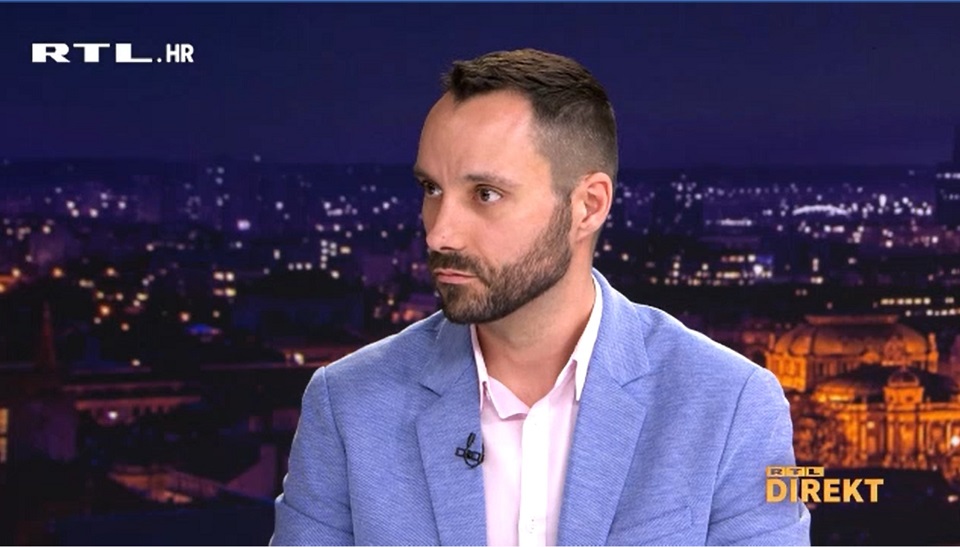
Ivo Šegota | RTL Direkt
At Christmas they were given a "gift" by the Administrative Court, but the couple began celebrating too soon.
Director Zagreb Social Welfare Center Won’t Implement Court Decision
A few days ago, a decision was made by the Social Welfare Center, in which the director, Brozić Perić, stated that she would refuse to acknowledge the court decision because she did not want to implement it. Both Mladen and Ivo will submit a complaint to the Ministry of Demography, and they are confident that it won't repeat the center’s absurd behavior and will hand down a valid legal decision.
"We have been waiting for a long time and hope that as soon as we file our complaint, the Ministry (of Demography) will react promptly in accordance with the laws and the decision of the Administrative Court," Ivo says.
They would be the first gay couple to foster a child, but there are already several same-sex couples who have children in Croatia.
Croatia Same Sex Couples with Children Doing Well
"We don't have official statistics, but we hang out with a lot of these families. Some have children who are already grown up, but recently we've had a little 'baby boom'. Such families have had much more positive experiences than one might expect. There are families from every part of Croatia, and everything is working out very well for them. Professionals, who deal with these children in kindergartens and schools, and neighbors, generally view everyone as human beings first. Especially when it comes to a child, few are willing to act to the detriment of a child," Mladen said.
Croatia Public Reactions Overwhelmingly Positive
By all accounts, they have taken on a difficult role. "When this all began, it was not our intention to make public appearances, but immediately we realized that the saying 'When, if not now and who, if not me' could easily apply to us as well. The narrative in Croatia will not go forward unless we make public appearances and fight for our rights because our institutions have been silent or have rejected us," Ivo revealed.
The reactions they receive are mostly positive, which is surprising. People approach them throughout the day, and they also have the support of family, employers and even strangers. The pair are convinced that it is time for same-sex couples in Croatia to be allowed to adopt children.
Croatia In Company with Moldova Regarding Same Sex Foster Parenting
"Croatia is currently in company with Belarus and Moldova on this issue. The question is whether we want to be in company with them or with Spain, Austria, Germany, Great Britain. We are currently heading the EU Presidency and are proud that we are the heart of Europe. So why don't we assume a European stance regarding this issue as well? I am somewhat convinced that we are ready. There has been a huge shift toward positive comments in just one year, which is why we are glad that we have decided to make our efforts public," said Mladen.
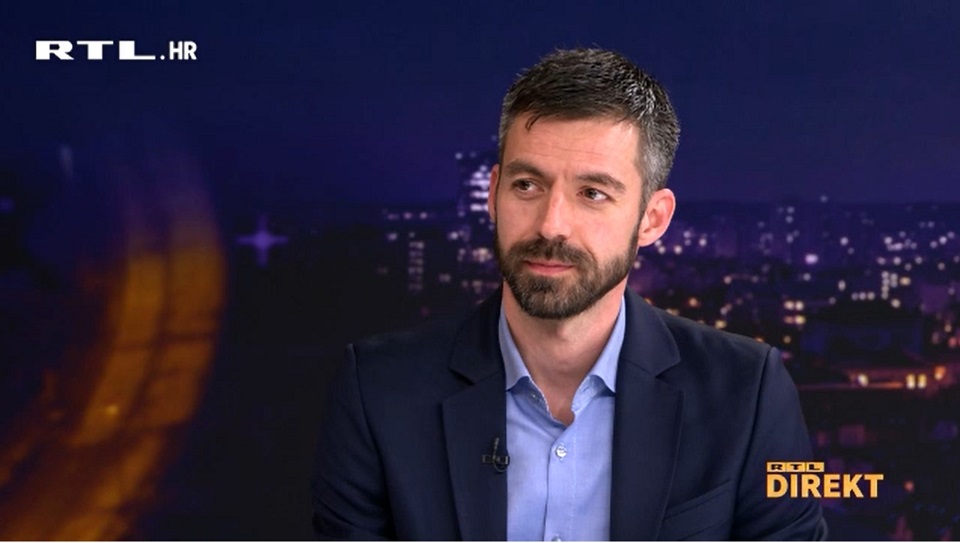
Mladen Kožić | RTL Direkt
Some are saying that it is not necessary to experiment, but Ivo has a counterproposal for them.
Over 1000 Children in Croatian Orphanages: Shortage of Foster Parents
"We are talking about a thousand or more children who are spending their childhood in orphanages. Let’s see our opponents foster two or three children, which is as many children as we would like to foster, and we could solve all our problems in Croatia. There would not be any children left for us to foster, and everyone would be happy, except for the two of us, perhaps. "We are a country full of hypocrisy, and we don't see those who voice the loudest opposition coming down to the (Social Welfare) Center (to become foster parents). And we have a chronic shortage of foster parents in Croatia," Ivo concluded.
Mojmira Pastorčić with Mladen Kožić and Ivo Šegota | RTL Direkt
Interview with Mladen Kožić | HRT
Information on the December 2019 court decision can be found here. Details about the Social Welfare Center’s rejection of the couple’s second foster care application can be found here.
A history of the couple's efforts to become foster parents and information on the LGBT rights movement in Croatia can be found here.
To learn more about the efforts of Rainbow Families (Dugine obitelji), check out their website and Facebook page.
Croatia Gay Couple Foster Care Application Rejected: Court Decision Ignored
The Social Welfare Center in Zagreb again rejected the foster care application submitted by Ivo Šegota and Mladen Kožić, who are life partners in Croatia. By doing so, they have completely disregarded the Croatian Administrative Court's December 2019 binding judgment, which allowed the couple to become foster parents after a long two-year court battle.
UPDATE: Mladen Kožić and Ivo Šegota give interviews to RTL Direkt and HRT on January 28, 2020. More information here.
Couple Had Started Preparing Home for Children
“We're shocked. After the December verdict, we had started planning how we would prepare our home for children, and I had already announced to my boss that, as soon as children arrived, I would be taking a long-term unpaid leave. And then a decision from the center arrives stating that they will not respect the court's decision. For the first half hour I kept saying, "But how is this possible?" And then I reminded myself that this is another small obstacle that Ivo and I will have to overcome together. We’ll go forward patiently and continue learning and developing our parenting skills. Giving up is not an option,” said Mladen Kožić. He added that he will appeal this unexpected decision, which came with an even more unexpected explanation, with his partner. In fact, the decision literally states that "this body could not arrive at a decision that is based on the application of legal provisions but is based on the opinion of the court."
Šegota and Kožić applied to the center in 2017 with to become foster parents. The center began the procedure, the partners passed the required screening tests and received a positive assessment, which was followed by compulsory education for foster parents and obtained their license. But instead, the center suddenly informed them that "there are no legal prerequisites for initiating the licensing process because they are in a life partnership," and life partners are not expressly listed in the Foster Care Act as possible foster parents. However, singles, spouses and extra-marital partners are listed, as reported by Kristina Turčin/Jutarnji List on January 28, 2020. They couple submitted a complaint to the ministry, which confirmed the center’s decision, and then they initiated an administrative procedure.
Croatia Court December Decision: Couple Can Become Foster Parents
At the end of December, the Croatia Administrative Court issued a judgment that could no longer be appealed, annulling the earlier rulings, and returns the case to retrial. However, the judgment was more than clear. Total Croatia News reported this court decision on December 20, 2019.
“By a meaningful interpretation of the legal provisions in their interconnectedness, the foster family, in the court's view, may include the foster parent and his or her life partner. The legislator did not prescribe a specific sexual orientation anywhere, so it is not logical that a single person having the same sexual orientation as the plaintiffs would be issued a foster care license if he/she fulfills the legal requirements. In this case, the legal requirements (for providing foster care) were not even examined in case of the plaintiffs because of the belief that life partners cannot be foster parents,” the Croatia court ruling read.
“As the respondent deems that the defendant applied an exclusively formalistic or grammatical interpretation of the relevant provisions of the foster care law, without interconnecting them and interpreting them in accordance with their meaning and purpose; the first instance body (Social Welfare Center) will reopen the foster care application process and decide to grant permission solely on the merits of the plaintiff's request,” the judgment ordered.
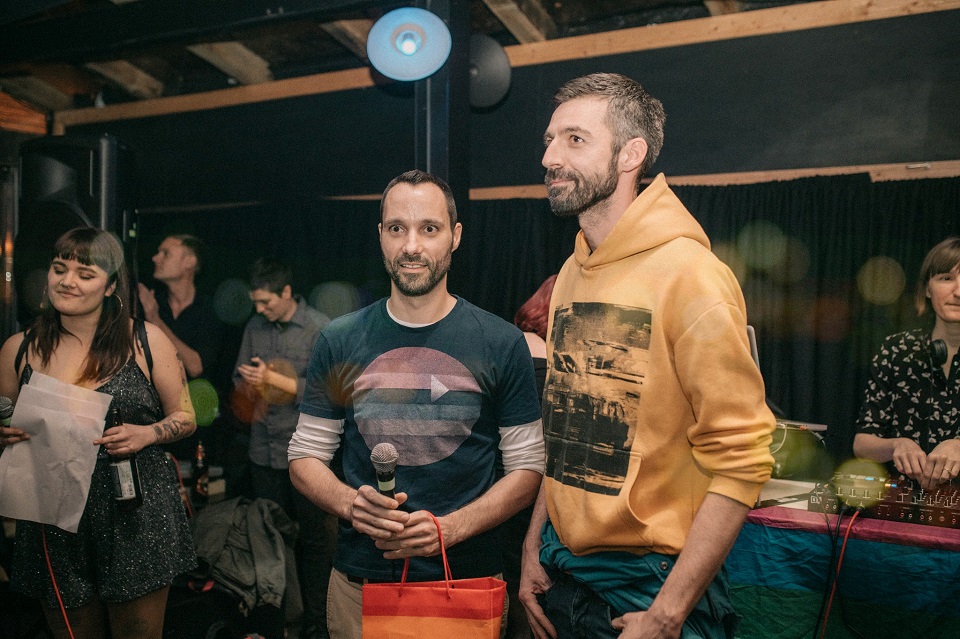
Ivo Šegota and Mladen Kožić | Facebook
Zagreb Social Welfare Center Denies Couple’s Application Again
However, the center issued the same decision as if there hadn’t been any judgments at all. Jutarnji List has not received an answer regarding the center’s decision because "CZSS (Social Welfare Center) Zagreb cannot provide details on proceedings in order to maintain official and professional secrets, respect the principles of secrecy, protect personal data and out of respect for privacy." The Ministry of Demography, Family, Youth and Social Policy would not comment and were surprised by Jutarnji List’s inquiry.
“Not only can we not comment on the decision of the center, but we are not aware of the fact that a new decision was made,” the ministry stated yesterday.
Zagreb Couple Must Appeal Decision Second Time
Šegota and Kožić must now go through the same procedure again, and an appeal of the center’s decision will be sent to the Croatia Ministry of Demography again.
“That's our next step. If the appeal is not upheld, we will return to the Administrative Court and ask that the court decide on its own and not return the proceedings to the beginning. These decisions by lower administrative bodies, which do not comply with binding judicial decisions, do not contribute to the rule of law. On the contrary, they insult the fundamental value of the constitutional order,” says lawyer Sanja Bezbradica Jelavić, who represents Šegota and Kožić.
“State institutions should adhere to court decisions,” says Gender Equality Ombudsperson Višnja Ljubičić.
Đuro Sessa: 'The decision of the center is not illegal, but it must have strong reasoning.'
The Zagreb Social Welfare Center may, in principle, issue the same decision that was reached previously since the court annulled that previous decision and sent the entire proceeding for reconsideration, explains Djuro Sessa, the Chief Justice of the Croatia Supreme Court.
“The court ruled that the case was going back for retrial. The court had the opportunity to resolve the issue on its own; not to seek a retrial but to replace the decision of the Social Welfare Center with its decision instead. The court could have decided to accept that the plaintiff's request, but they did not do so. Therefore, the center could arrive at the same decision, but the rationale for the decision should have been far more thorough,” Sessa adds.
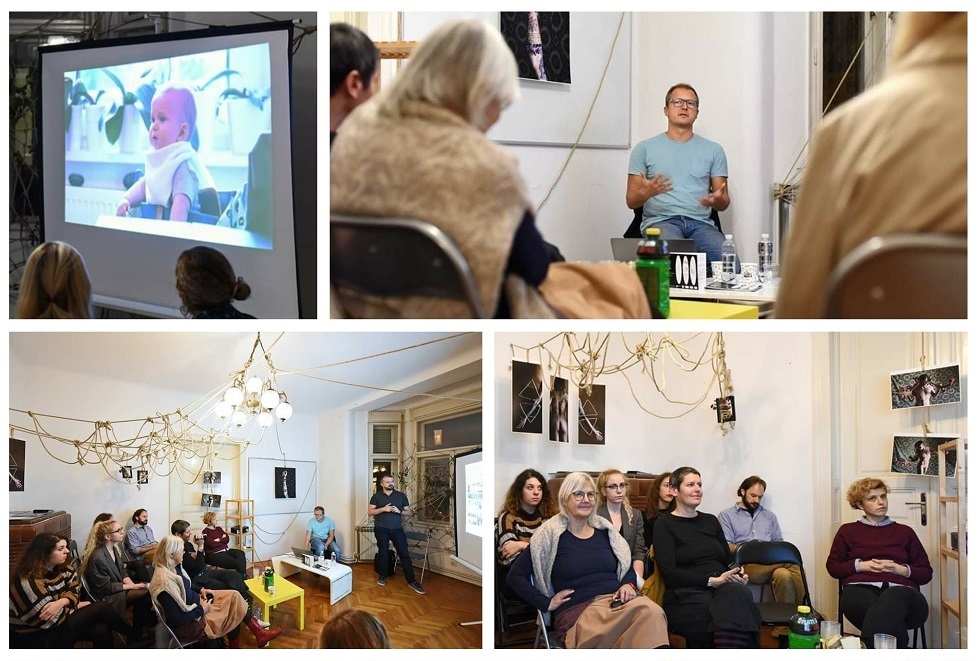
Rainbow Families | Facebook
Croatia Based 'Rainbow Families' Releases Statement
Rainbow Families (Dugine obitelji), which brings together LGBTI parents and those who wish to become parents in Croatia, released a statement today. It is printed below in full.
“It is unacceptable that the rule of law does not function in Croatia, which currently holds the EU Presidency and that court judgments are not respected.”
“The Administrative Court ruled in December 2019 that Ivo Šegota and Mladen Kožić, life partners who wish to become foster parents, have full rights in their intent. The ruling also indicated that they must not be discriminated against in these proceedings. The Social Welfare Center in Zagreb disregarded the court judgment and again rejected the foster application submitted by Mladen and Ivo. Rainbow Families, which brings together LGBTI parents and those who wish to become parents, consider the center’s actions outrageous. The center is acting as if the Administrative Court's judgment does not exist.”
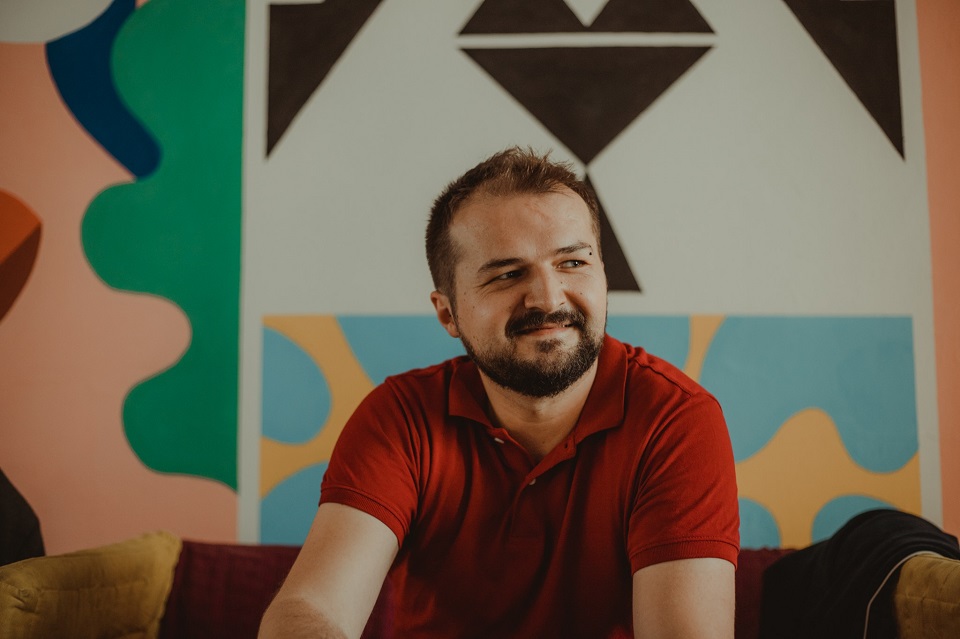
Daniel Martinović | Rainbow Families
“’This situation was already unbelievable, and it would be ridiculous if it weren’t so sad. The December 2019 decision of Administrative Court gave all of us, who believe in equality and respect for human rights, hope that there is a better future for our society. Since then, we have received an incredible number of messages of support regarding the December court verdict confirming our members, Ivo and Mladen, have the right to become foster parents. People have been stopping them on the road and congratulating them. And now we must witness this reckless, unthinkable, and more importantly, illegal conduct of the Social Welfare Center. What would the Social Welfare Center look like if it ignored the court's decision, for example, and allowed an abusive parent access or information about a child?’” Daniel Martinović, coordinator of Rainbow Families, pointed out.
"Our politicians are constantly heaping praise on our country simply because it currently holds the Presidency of the Council of the European Union. We are also told repeatedly about what a great honor it is for all of us, how proud we can all be of Croatia, how it is proof that we stand side by side with other EU countries. It hasn’t not even been a month since that famous presidency began, and we already have countless examples of where that all falls into the water. We consider this the worst example so far because it shows that institutions in this country do not respect the rule of law or court judgments, which is unthinkable in countries like Germany, Belgium or France."
"Life partners Ivo and Mladen will appeal to the Croatia Ministry of Demography regarding the center’s decision. If the ministry does not accept that appeal, they will go back to the Administrative Court and ask the court to make its own decision. Judging by the first ruling of the Administrative Court, they are fully entitled to become potential foster parents, and legal experts are already warning of the problematic situation the center's decision (last week) will create."
"Basically, in the first decision, the center rejected Mladen and Ivo’s application. However, they did not correctly apply the legal provisions of the Republic of Croatia, and when they were corrected by the relevant court, which rendered a binding decision, they interpreted the court's judgment as 'an opinion' which is not binding, and thus refused to correct their own misinterpretation of the law."
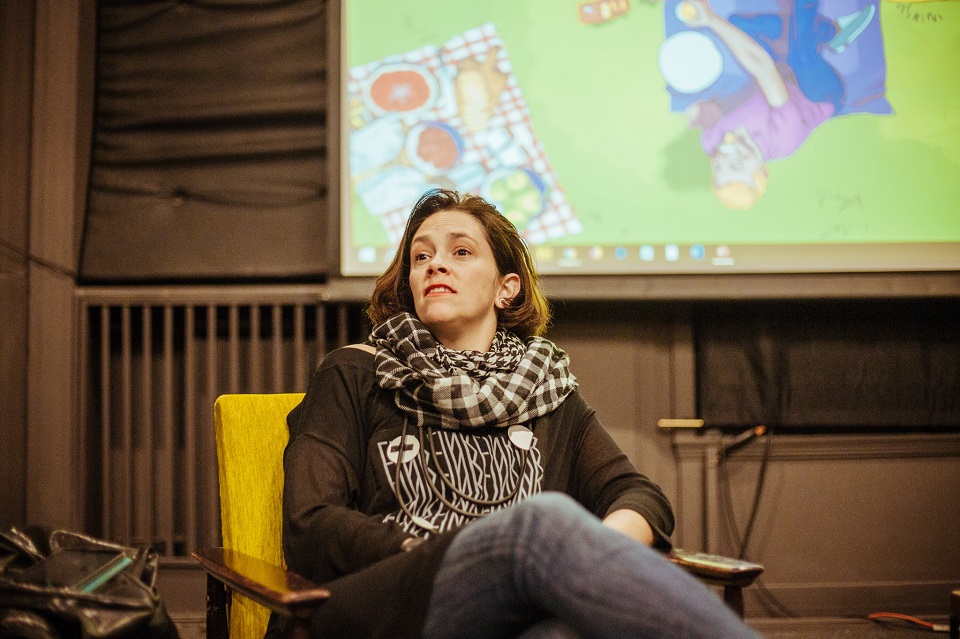
Zrinka Bojanić | Rainbow Families
"'The center’s disregard for the ruling of the Administrative Court causes great legal uncertainty and is harmful LGBTI citizens who are protected by several Croatian laws and European case laws. The judgment clearly instructed the center to decide on the merits of the plaintiffs' request, but they rejected that request, which is contrary to the judgment. They have demonstrated that they do not want to act on the couple’s request to become foster parents, which they submitted back in 2017. If this case is brought before the European Court of Human Rights, there is a very good chance that Croatia will again be forced to respect all its citizens equally and grant them equal rights on equal terms,'" explained attorney Zrinka Bojanić, an associate of Rainbow Families.
Mladen Kožić and Ivo Šegota | Press Conference | December 21, 2019
A history of the couple's efforts to become foster parents and information on the LGBT rights movement in Croatia can be found here.
UPDATE: Mladen Kožić and Ivo Šegota give interviews to RTL Direkt and HRT on January 28, 2020. More information here.


